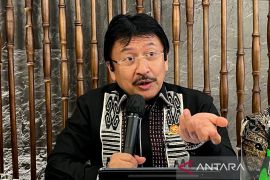The director ordered a halt to the execution."Oklahoma City (ANTARA News/Reuters) - Oklahoma halted the execution of Clayton Lockett on Tuesday (April 29) due to problems with its lethal injection, but the inmate later died of an apparent heart attack about 40 minutes after the drugs started to flow into his body, a prisons spokesman said.
Thirteen minutes after administering a lethal injection, the inmate lifted his head and started mumbling and the doctor on scene halted the execution, said state corrections department spokesman Jerry Massie.
"We believe that a vein was blown and the drugs werent working as they were designed to. The director ordered a halt to the execution," Massie said.
Lockett apparently died of a massive heart attack less than an hour after the execution drugs were administered, he said.
The execution had been put on hold for several weeks due to a legal fight over a new cocktail of chemicals for the lethal injection, with lawyers arguing the state was withholding crucial information about the drugs to be used.
Last week, the state Oklahoma Supreme Court lifted stays of execution for Lockett and another inmate who was also scheduled to be executed on Tuesday, saying the state had provided them with enough information about the lethal injection cocktail to meet constitutional requirements.
The other inmate, Charles Warner, who was scheduled to be put to death two hours after Lockett on Tuesday, has been granted a 14-day stay of execution after the problems, Massie said.
Oklahoma had set up a new lethal injection procedure and cocktail of chemicals earlier this year after it was no longer able to obtain the drugs it had once used for executions.
Oklahoma and other states have been scrambling to find new suppliers and chemical combinations after drug makers, mostly in Europe, imposed sales bans because they objected to having medications made for other purposes being used in lethal injections.
Attorneys for death row inmates have argued that the drugs used in Oklahoma and other states could cause unnecessarily painful deaths, which would amount to cruel and unusual punishment in violation of the U.S. Constitution.
(Uu.S022)
Editor: Priyambodo RH
Copyright © ANTARA 2014












